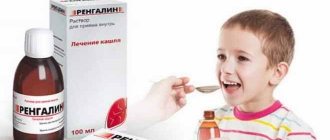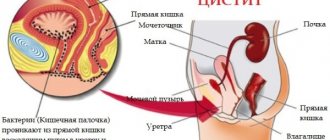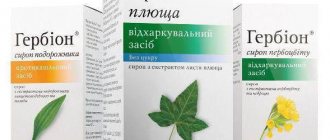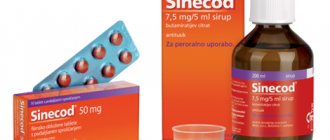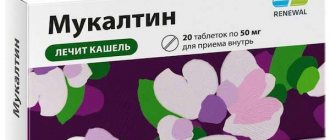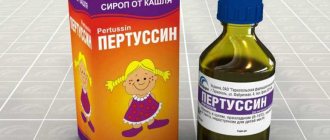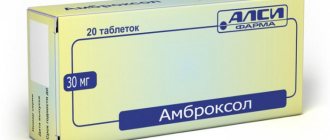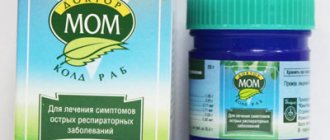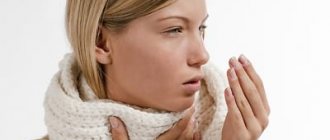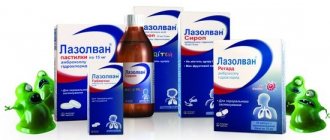Cough syrup is an oral medication that suppresses the cough reflex or stimulates the coughing up of mucus. Depending on the active ingredients, there are 4 types of drugs - mucolytic, expectorant, antitussive and combined. The choice of syrup is influenced by various factors - the age of the patient, the form of the disease, and the productivity of the cough. Many medications contain components that eliminate other manifestations of the disease - soreness in the throat, swelling of the mucous membranes.
Effective drugs for adults
Liquid cough medicines are produced for both adults and children. Age restrictions are usually specified in the annotation for the medication.
Lazolvan
Colorless and almost transparent Lazolvan with the aroma of wild berries based on ambroxol hydrochloride (a metabolite of bromhexine) represents a pharmaceutical group of expectorant and mucolytic medications. Promotes increased production of pulmonary surfactant and stimulation of ciliary activity. Due to this, the current and evacuation of mucus are enhanced, sputum discharge is improved, and coughing is relieved. Contains fructose as an excipient.
Ambrobene
The structural and pharmacotherapeutic analogue of Lazolvan, Ambrobene, is distinguished by its yellowish color and pronounced raspberry aroma. Like Lazolvan, it is prohibited to use if you are allergic to fructose or have glucose-galactose malabsorption.
ACC syrup
The active ingredient acetylcysteine in ACC syrup exhibits a mucolytic and expectorant effect due to a direct effect on the rheology of bronchial secretions. It is a colorless, transparent, somewhat viscous mass with a cherry aroma. A good medication for the treatment of coughs with sputum that is difficult to separate. There is a list of contraindications.
Fluimucil
Fluimucil, an expectorant and mucolytic drug, is produced in the form of solutions of 20 mg/ml and 40 mg/ml. In the first case, the solution has a characteristic raspberry aroma with a faint sulfuric tint, in the second - a strawberry-pomegranate aroma with a faint sulfuric odor. The active ingredient in these solutions is acetylcysteine. This medicine is an analogue of ACC.
Gedelix
Gedelix, a medicine for coughs with difficult to separate sputum, is a group of expectorant medicines of plant origin. The active component is ivy leaf extract, which looks like a yellow or yellow-brown liquid of a viscous consistency with a peculiar odor. The therapeutic effect is due to the presence of saponins in the composition. Contains fructose.
Bronchipret
Gedelix's analog Bronchipret also belongs to herbal-based products (ivy extract). Not recommended for those with intolerance to fructose and other components, or for pregnant and lactating women.
Rengalin
The antitussive drug Rengalin is produced in the form of a colorless or almost colorless solution. Antibodies to bradykinin, morphine and histamine were used as a basis. According to the instructions, it is indicated for bronchospasm, dry and wet cough, including those of an allergic nature. Contains fructose.
Sinekod
A medication for the symptomatic treatment of dry cough, Sinekod is a colorless substance with a vanilla aroma. The active ingredient is butamirate, which is neither pharmacologically nor chemically an opium alkaloid. The pharmaceutical group is a centrally acting antitussive that suppresses the cough reflex due to a direct effect on the corresponding brain center. Contains sorbitol.
Fluditek
The mucolytic agent Fluditex is a transparent green substance with a caramel odor. The active ingredient carbocisteine reduces mucus production and activates the ciliated epithelium. Contraindicated in cystitis, chronic glomerulonephritis, acute forms of ulcers.
Bromhexine syrup
The active ingredient bromhexine and its metabolites are found in many cough medications with difficult to cough up secretions. Transparent, vanilla-smelling Bromhexine belongs to the group of mucolytic medications that facilitate coughing. Contraindicated for peptic ulcers and in the 1st trimester of pregnancy.
Bromhexine 4 solution Berlin-Chemie
The solution with this name is a clear, colorless liquid with the smell of apricot. The pharmacotherapeutic properties are similar to Bromhexine syrup. Activates the ciliated epithelium, increases sputum secretion and improves its evacuation.
Bronholitin
Combined antitussive agent of central action. Glaucine and ephedrine are the active components of the syrup. The additional composition includes basil oil, citric acid, sucrose, polysorbate, and other substances. It has bronchodilator and antitussive properties and is indicated for dry cough. Has many contraindications.
Pertussin-Ch
A dark brown substance with a characteristic aroma is a herbal medicine to relieve cough with thick bronchial secretions Pertussin-Ch. The base is creeping thyme extract and potassium bromide, additional components are ethanol, water, sugar syrup. Improves expectoration. There are contraindications.
Syrup Codelac Neo
An analogue of Sinekod syrup with the active ingredient butamirate citrate. Refers to antitussive medications of central action. It is a colorless substance with the smell of vanilla. Contains fructose, as well as ethyl alcohol, which is why caution is required when used in patients with pathologies of the liver, brain, epilepsy, alcoholism and others.
Libexin Muco
Libexin Muco syrup is intended for the treatment of cough with viscous, difficult to separate secretions. Core – carbocisteine; A mucolytic medication that facilitates coughing. Viscous liquid of light brown or yellow-brown color. Not recommended for cystitis, chronic glomerulonephritis, exacerbation of ulcers and duodenum, pregnancy.
The nature of cough in various diseases
Syrup Omnitus
Transparent, colorless Omnitus with vanilla aroma is an analogue of Codelac Neo, Sinekod and other syrups based on butamirate. Pharmaceutical group of centrally acting antitussive medications. Indicated for dry cough of any nature, it exhibits anti-inflammatory, bronchodilator and expectorant effects.
Ambrohexal
Ambrohexal is produced in the form of a syrupy, transparent yellowish or colorless solution. Analogue of Ambrobene, Lazolvan and other medications based on ambroxol. Contains fructose.
Bronchicum S
Syrup based on common thyme extract Bronchicum S is an analogue of Pertussin and most medications with this ingredient. Reddish-brown transparent or slightly opalescent liquid. Medicine to relieve expectoration.
Halixol syrup
Pale yellow or colorless Chalixol with a characteristic aroma represents a group of expectorant mucolytics. An analogue of medications based on ambroxol. Prohibited for ulcerative lesions of the gastrointestinal tract and in the 1st trimester of pregnancy.
Flavamed
An analogue of medications with ambroxol, a clear, colorless or brownish liquid with a raspberry aroma in a dark glass bottle. Flavamed has an expectorant and sputum thinning effect and contains fructose.
overslept
Syrup based on ivy leaf extract, an analogue of Gedelix, Pectolvan and similar medications. Viscous light brown liquid with cherry aroma. Not recommended for the treatment of cough during pregnancy.
Pertussin
Syrup based on the extract of common thyme, or Pertussin thyme, is a thick, aromatic brown liquid. Analogue of Pertussin Ch, facilitates coughing, not recommended for pregnant women.
Stoptussin-Fito
A combined herbal remedy based on liquid extracts of creeping and common thyme and plantain. Brown syrup with a specific aroma. It has a list of contraindications, including for women carrying a child.
Gerbion
Herbion syrup is available in three variations - based on ivy, plantain, and primrose. All 3 belong to the pharmaceutical group of expectorant herbal medications.
Herbion ivy syrup
Ivy leaf syrup is a yellowish-brown aromatic liquid. Analogue of Gedelix and Prospan. It has an expectorant, broncho-spasmolytic effect, thins mucus. Contains sorbitol. Not recommended for pregnant women and breastfeeding women. One of the best drugs to relieve cough in adults.
Herbion plantain syrup
Combined cough medicine. Core: plantain extracts, mallow flowers, ascorbic acid. Contains orange oil, sucrose. It also exhibits antibacterial and anti-inflammatory effects. Not recommended for diabetes mellitus or fructose intolerance.
Herbion primrose syrup
The active core of this syrup is extracts of primrose root (1.03 g) and common thyme (2.06 g). Additional substances include other plant components. Brown, specific-smelling syrup with expectorant, anti-inflammatory and antimicrobial effects. There is a list of contraindications.
Elixir Bronchicum TP
Based on extracts of primrose roots and thyme herbs, the elixir Bronchicum TP is also produced - a red-brown or dark brown solution with the aroma of thyme. Properties: expectorant, antimicrobial, bronchodilator, anti-inflammatory. Contains sucrose and ethyl alcohol.
Pectolvan ivy
Analogue of drugs Gedelix, Prospan, Gerbion. The core is a dry extract of ivy leaves. Light brown aromatic liquid. The broncho-spasmolytic, mucolytic and coughing effect is due to the presence of saponins in the base of the drug. Contains fructose, sucrose.
Syrup Doctor Theiss with plantain
The composition of the additional ingredients of this syrup is interesting, including: sucrose, honey, potassium sorbate, beet syrup. Brown viscous solution, opaque, with a specific aroma. It has mucolytic, anti-inflammatory, cough properties.
Syrup Doctor MOM
Dark green syrup with a pineapple scent based on dry extracts of medicinal plants (10 components in total), providing an expectorant effect. The excipients include levomenthol, sucrose, sodium benzoate, dyes. There are practically no contraindications for adults, with the exception of pregnancy and breastfeeding.
Linkas
A viscous brown liquid with a pronounced herbal aroma is Linkas syrup based on 10 medicinal plants. Contains fructose, sucrose. The multicomponent composition provides anti-inflammatory, mucolytic and expectorant effects.
Suprima-Broncho
Suprima-Broncho syrup, produced in India, is similar in composition to Doctor MOM: it contains the same composition of plant extracts that have an expectorant effect. The manufacturer does not indicate the extraction method, but it can be assumed that this is done using alcohol. Suprima-Broncho can cause allergic reactions due to its extremely diverse composition.
Bronchobos
Bronchobos syrup, like the Fluditec and Libexin Muco discussed above, contains carbocysteine and can be used to treat patients over 3 years of age (at a concentration of 2.5%). There is a second version of this drug with a carbocysteine content of 5% - it is recommended for the treatment of adults. The syrup is produced in Bosnia and Herzegovina and is also sold on the European market.
Bronchorus
Bronchorus syrup contains one of the most common expectorant substances - ambroxol. The drug, unlike most syrups, does not contain alcohol, which makes it possible to use it in all groups of patients, including newborns. The medicine is produced in Russia.
Syrups for children aged 2 years and older
Children over 2 and 3 years of age are treated the same as preschool children; the appropriate dosage for them is usually comparable to that prescribed for a 5-year-old child. When choosing a remedy, many criteria are taken into account, the main of which are clinical history, the child’s condition at the time of visiting the doctor, the nature of the cough and general physical development. The main cough syrups for older children are:
- Gelisal . The drug is of plant origin, based on ivy squeeze. The anise aroma is soothing and makes taking the medicine pleasant. The syrup can be diluted with water or juice.
- Liquorice root . The syrup contains alcohols, so it should be diluted with water before use. Children are prescribed half a teaspoon several times a day. The drug quickly relieves tension from the mucous membranes of the pharynx, relieves spasms, and has a beneficial effect on the general condition during attacks of painful cough.
- Alteyka syrup . The herbal preparation, based on the extract of the marshmallow rhizome, is prescribed to children of any age, but it is safest from 2-3 years of age. The plant is effective for spasmodic coughs to the point of vomiting, it dilutes difficult mucus well, and coats the irritated mucous membrane of the throat.
- Eucabal syrup . The active composition of the syrup includes plantain, pine and eucalyptus oils, and thyme extract. The herbal remedy must not be diluted with water before use; it is suitable for the treatment of wet and dry coughs with a rapid tendency to develop complications.
- Linkas . The syrup has a soft mint aroma and contains extracts of marshmallow and hyssop rhizomes, extracts of capsicum, alpinia, cordia, violet flowers, and jujube. The composition is complemented by oils of peppermint and clove flowers, as well as licorice root, onosma, adhatoda. Linkas based on medicinal plants is used in the treatment of young children in the absence of allergies to any components of the drug.
- Bronchicum syrup . A combined drug with thyme extracts and wild rose essential oil is suitable for dry coughs for better removal of phlegm. Take 1 teaspoon several times a day. The duration of treatment does not exceed 7 days. The drug has a light aroma of honey and cherry, which greatly facilitates the treatment of the child.
- Stoptussin-Phyto syrup . The basis of the drug is extracts of plantain and thyme. The optimal dosage for dry and wet cough is 1-2 teaspoons 3 times a day after meals. Before prescribing, you should consult a doctor due to the high risk of allergic reactions.
- Bromhexine Berlin-Chemie . Sweet cough syrup with apricot flavor will appeal to the most capricious children. The drug is suitable for the treatment of dry paroxysmal cough with difficult to separate sputum.
- Tussamag syrup . The drug is based on thyme and plantain extract. Prescribed for long-lasting barking cough. The drug is sold from pharmacy chains without sugar, which is important for patients with diabetes.
- Dr. Theiss . Products with mint oil and plantain extract are used to treat children over 2 years of age. Pediatricians often use syrup to treat infants. The drug should be taken with plenty of water.
- Travisil . Multicomponent herbal remedy for painful, painful cough in children. The composition includes extracts of fennel, black pepper, justice, abrus, ginger. Also, the composition is complemented by basil, turmeric, licorice, terminalia, alpinia. There is a high risk of developing side effects in the form of local allergic reactions (rash, itching, skin hyperemia).
- Gerbion syrup . Pharmacy chains offer a wide range of Gerbion cough syrups. Syrups are made for babies with dry cough (mallow, plantain), and wet cough (thyme and primrose). All these products are recommended for older children from 3 years of age. The syrup should be washed down with water or warm tea.
- Pertussin . The drug contains potassium bromide and thyme extracts. The syrup is approved for use in children over 3 years of age. The optimal dosage is 1-2 teaspoons 3 times a day.
- Suprima broncho . A herbal multicomponent preparation based on extracts of licorice, basil, nightshade, capsicum, adatoda, ginger and cardamom. The aroma of raspberries makes the treatment pleasant and easy. Often the recommended dosage is 2 teaspoons 3-4 times a day. Shake the bottle of medicine thoroughly before use.
- Coltsfoot and plantain . The plant syrup additionally contains eucalyptus and mint. Recommended for the treatment of children over 4-5 years old on the recommendation of a doctor. The total duration of therapy should not exceed 14 days.
- Ambrohexal . The active substance is included in many combined and synthetic syrups, for example, analogues Codelac Broncho, Halixol, Lazolvan, Ambrobene. The syrup is taken 2 teaspoons several times a day on the recommendation of a doctor.
- Tussin . The main component is the substance guaifenesin, which acts on the muscle muscles of cough receptors. The drug reduces spasms, relieves inflammation and helps in removing phlegm.
- Omnitus . The synthetic syrup contains butamirate citrate. The substance is effective against whooping cough, a barking whooping cough in children over 2-3 years of age.
- Codelac . Thermopsis extracts and codeine included in the drug have a beneficial effect on the mucous membranes of the nasopharynx and lower respiratory tract during bronchitis, tracheitis, and complex pneumonia.
Cough syrup, inexpensive and effective, can be selected in accordance with the general clinical picture of the disease. All syrups are recommended for use only after visiting a pediatrician. Considering the speed of development of complications with wet cough in children, inadequate therapy will not only not bring relief, but will also contribute to the development of bronchitis, focal pneumonia, and pulmonary diseases of an infectious nature.
Inexpensive medicines
A relatively inexpensive and effective cough syrup for adults can be found among medications containing ambroxol:
- Ambrobene, Ambrohexal, Ambroxol and others;
- Lazolvan;
- Halixol;
- Flavamed.
Medicines based on ivy leaves are also popular due to their effectiveness and low cost:
- Gedelix;
- Gerbion.
The price varies depending on the volume of the drug in the package.
The cheapest among syrups are Pertussins based on thyme herb extract.
General contraindications to herbal syrups
All herbal preparations have a similar list of contraindications:
- Use for younger children than indicated in the indications for use;
- Diabetes mellitus, hereditary enzymopathies associated with a deficiency of enzymes necessary for the metabolism of substances included in the drug;
- Pregnancy and lactation in most cases;
- Hypersensitivity to the components of the drug;
- Severe chronic background diseases - arrhythmias, diseases of the liver and kidneys, biliary tract.
What can you do during pregnancy?
Not every cough syrup used in adults has been clinically tested for use in pregnancy. In the annotations for such drugs, a disclaimer is given - it is not recommended for the treatment of pregnant women.
When choosing a syrup for pregnant women, you should read the instructions and see if the medicine has teratogenic properties and does not contain ethyl alcohol and other substances dangerous to the fetus. You can choose the syrup that pregnant women are allowed to drink when coughing from the following list:
- Bronchicum;
- Marshmallow syrup;
- Lazolvan and other medications with ambroxol;
- Herbion primrose syrup;
- With caution - Coldrex broncho, Tussin, Suprima-Broncho.
In order not to harm not only herself, but also the unborn baby, the mother should take into account the purpose of the syrup - for what kind of cough can you drink it during pregnancy, dry or wet. Only the one that suits the therapeutic goal should be selected.
During pregnancy, the drug for treatment must be prescribed by a doctor
Operating principle
Herbal cough syrups affect the body of a sick person thanks to the active components of plant origin.
Herbal cough syrup may contain different ingredients. The syrup may contain several standard components that most effectively combat signs of inflammation in the respiratory tract.
- Thermopsis grass. Combined preparations of plant origin will contain thermopsis. The alkaloids present in the body parts of this plant have a significant expectorant effect. Thermopsis also contains tannins, thanks to which it is possible to destroy pathogenic microorganisms. Modern pharmacy uses thermopsis to impart an expectorant and anti-inflammatory effect to the drug.
- Liquorice root. Licorice has a lot of positive effects not only on the respiratory system, but also on metabolism and the condition of connective tissue. Licorice root extract helps with inflammation, relieving its severity. A pleasant bonus is the excellent taste of this medicinal component. Licorice root is soft and sweet, which is why children especially adore it.
- Althea. The marshmallow plant has also been in demand among healers and healers since ancient times. It helps restore irritated mucous membranes of the respiratory tract, fights inflammatory processes, thins mucus and promotes its release from the body.
- Thyme. Helps to cough up mucus, since the substances present in its composition are bitter. Thyme contains tannins, resins, vitamins, and beneficial microelements. It has an antiseptic, wound-healing, disinfectant effect on the tissues of the human body.
- Eucalyptus. Although it does not grow in our latitudes, the modern pharmaceutical industry “squeezes all the juices” from this plant. The composition of eucalyptus extract includes resins, tannins, bitter substances, antimicrobial and antifungal phytoncides, and various alkaloids. It affects various pathogenic microflora, in particular streptococci, staphylococci, trichomonas, mycobacterium tuberculosis.
- Mint. Sweet mint growing in our fields and lawns is widely used in the production of cough syrups. It helps reduce inflammation, relieve swelling, and reduce the severity of pain due to the “cooling” effect. Mint also helps relieve coughing spasms.
- Coltsfoot. This plant in syrups helps the mucous membrane itself, which suffers greatly from inflammation and cough. It envelops the nasopharynx, oral cavity, and throat of the sick person with a delicate layer.
- Elecampane. The name of this plant speaks for itself. Helps thin mucus, making the latter excreted much more actively. Elecampane contains natural antioxidants that help prolong the lifespan of human cells.
Cough syrups for adults and children include other medicinal plants, including plantain, pine buds, sage and so on. The composition of the drug is limited only by the imagination of pharmacists developing medicines.
Plant-based herbs
For those who prefer to be treated with herbal medications, herbal syrups or combination products are recommended. These include:
- Marshmallow syrup based on marshmallow roots;
- Bronchicum and similar syrups;
- Herbion line of medications – ivy, primrose, plantain syrups;
- Gedelix and similar medications;
- Linkas on 10 herbs;
- Pertussin;
- Breast elixir based on anise seed oil and licorice root extract;
- Thermopsis syrup with licorice is a combined remedy;
- Syrup Doctor IOM based on 10 plants;
- Licorice syrup;
- Suprima-Broncho with 8 herbal ingredients.
Syrups with herbal components should also be selected taking into account the nature of the cough: antitussives are suitable for eliminating dry coughs, and mucolytic and expectorants are suitable for difficult to separate secretions.
What are the types of cough?
Treatment and elimination of this symptom of the disease depends directly on its type and characteristics of its manifestation. In medicine, several main types of cough have been identified.
- Dry - observed in the first period of the disease, occurs without the appearance of sputum and expectoration.
- Wet - during the process, mucus and phlegm come out of the respiratory organs.
- Permanent is a very dangerous type in which a person cannot even take a deep breath. Characterizes serious diseases of the respiratory system.
- Periodic – characterized by a one-time manifestation, without attacks or convulsions.
To treat such a reaction of the respiratory system, doctors recommend using herbal syrup. Which one is better to use depends on the age of the patient. So there are medications intended for infants, children and adults.
The best anti-inflammatory and expectorant
Many syrups for cough relief, in addition to the expectorant, exhibit an anti-inflammatory effect, which is preferable for a protracted, debilitating cough. Among these syrups are:
- Herbion with plantain;
- Herbion with primrose;
- Omnitus;
- Elixir Bronchicum TP;
- Linkas;
- Syrup Doctor Theiss with plantain.
The nature of the cough is indicated by its duration: up to 3 weeks - acute, more than 3 weeks - protracted, more than 3 months - chronic.
Drugs approved for babies under one year of age
Gedelix syrup
Gedelix is often used to treat dry cough in infants in their first year of life. The syrup is based on plant substances, which ensures the safety and reliability of the medicine.
The main component of the medicine - an extract from ivy leaves - has a mild and effective effect. Extracts of medicinal herbs help relieve inflammation in the bronchi and remove accumulated mucus.
The manufacturer recommends using it for all types of cough. The drug does not suppress the symptom, but helps to moisturize a dry, painful cough. Within a few days, the child begins to cough productively, coughing up excess pathogenic mucus. This way, the airways are cleared, and coughing bothers the baby much less often. For wet coughs, Gedelix syrup helps quickly get rid of phlegm.
The course of treatment with Gedelix should be at least a week, although parents may notice improvements much earlier. It is advisable to use the syrup for 1-2 days after the clinical condition of the baby improves.
You should not take the drug if your child is prone to allergic reactions, bronchospasm,
bronchial asthma
. The herbal extracts contained in the medicine can provoke the manifestation of the disease.
Eucabalus
The medicine Eucabal can be found in the pharmacy in two forms - syrup and balm. The balm contains vegetable oils of pine needles and eucalyptus, and the medicine is used for rubbing and inhalation.
The main effect of the syrup is due to the liquid extract of plantain and thyme included in the composition. These plants have been famous since ancient times for their ability to relieve coughs. The medicine has a significant anti-inflammatory and expectorant effect, transforming a non-productive cough into a wet one.
Thanks to the thyme contained in the syrup (popularly called thyme), the medicine helps fight bacteria. Thyme contains phytoncides and phenols that are harmful to bacterial and fungal flora. The substance has a significant antispasmodic effect, helps remove phlegm and reduces the risk of developing bronchospasm.
Plantain plays the role of an anti-inflammatory agent in the composition of the medicine, reduces swelling and irritation of the bronchial mucosa.
Since the drug is well tolerated, the syrup can be used from 6 months of age. The duration of therapy is determined by the doctor taking into account the clinical manifestations of the disease, but the total duration of treatment should not exceed 3 weeks.
Cough syrups for children
The drug annotations indicate age restrictions, if any. Let's consider those syrups that are approved for the treatment of small patients:
- Bronchicum S – allowed from 6 months;
- Pertussin - used from 3 years;
- German-made Tussamag is legal from birth;
- Tussin Plus – from 6 years old;
- Fluifort – from 12 months;
- Lazolvan – from 6 years old;
- Vicks Active AmbroMed – from 12 months;
- Panatus - from 3 years;
- Suprima-Broncho - from 3 years.
The list of medications for the treatment of cough in children can be continued, which indicates the wide possibilities of the pharmaceutical industry in this direction.
For children by age
Infants and preschoolers are usually prescribed liquid medications (drops, syrups). Teenagers can take pills. It is necessary to contact a pediatrician so that a pediatric specialist determines the nature of the cough and the most appropriate treatment.
Up to a year
There are harmless causes of cough in infants. These include the accumulation of milk or formula residues in the throat, excessive salivation, and teething. Coughing in infants often leads to the contents of the stomach rising along with the reflexively exhaled air and vomiting occurs. Long-term persistence of the symptom depletes the body and disrupts sleep at any age.
You can give your baby for a dry cough:
• herbal remedy Prospan; • Lazolvan syrup - from 1 month; • Sinekod drops - from 2 months; • Stoptussin - from 6 months; • elixir Bronchicum - from 6 months; • combination product Linkas - from 6 months. When a dry cough in infants becomes wet, they begin to treat with Bromhexine syrup and Bronchipret drops.
From year
The drugs Gerbion, Prospan, Bronchicum are used to treat dry cough. If the baby has seizures at night, then they give Sinekod or Stoptussin. These drugs should not be abused, as they do not act on the cause of the disease and do not help in all cases. When the cough becomes wet, switch to Eucabal, Bronchipret, Tussamag, Flavamed or Doctor Theiss syrups.
From 2 years
Dry cough is treated with Gedelix, Prospan, Gerbion, Lazolvan. Children over 2 years old can take Sinekod or Stoptussin drops at night. If the baby’s cough is wet, then they give one of the following remedies: Bromhexine, Eucabal, Fluditek, Bronchipret (drops), Tussamag, Ambroxol, Doctor Theiss.
From 3 years
A dry cough is the cause of irritation and weakening of the functions of the upper respiratory system. The drugs Bronholitin, Sinekod, Codelac Neo, Omnitus temporarily improve the condition of the respiratory tract. Antitussives do not affect the cause, but suppress the reflex. Simultaneous use with mucolytic drugs leads to a phenomenon that is popularly called “flooding” of the lungs.
Antitussive drops and syrups are contraindicated during active sputum production. In this situation, other medications are needed.
10 effective syrups for dry cough for children over 3 years old:
1. Ambrobene Stoptussin. 2. Doctor Mom. 3. Bronchicum. 4. Gedelix. 5. Lazolvan. 6. Overslept. 7. Ascoril. 8. Herbion. 9. Links. 10. Althea. For a wet cough, to speed up recovery, the child is given syrups: Bromhexine, Eucabal, Fluditec, Bronchipret, Tussamag, Ambroxol, Doctor Theiss, Pertussin (one of the drugs). A frequent companion to infectious and inflammatory diseases of the respiratory tract is a cough (first dry, then wet). A change in the nature of a symptom is an important signal for changing the drug. Parents should remember which syrups are used for dry coughs and which ones to give to the child for wet coughs. It is recommended to discuss this issue at an appointment with your pediatrician and at the pharmacy.
What syrups are recommended for dry cough?
A cough that does not bring relief and is not accompanied by sputum discharge is called dry or unproductive. With this nature of the cough reflex, the use of antitussive syrups and bronchodilators is appropriate. Among them:
- Bronholitin, Bronchoton, Bronchocin (glaucine with ephedrine and basil oil);
- Erespal (fenspiride) and others.
- For viscous, difficult to separate sputum, mucolytics are recommended:
- ACC, Fluimucil solution (acetylcysteine);
- Libexin Muco (carbocysteine) and others.
If you have difficulties in independently determining the nature of your cough, you should not experiment with medications. A visit to the doctor is the only right decision.
What is dry cough
For some people, the difference between a dry and wet cough is unclear. Dry cough is easy to identify. It is not accompanied by sputum production, the patient cannot cough up, it is painful and painful, and occurs in the initial stages of the development of infectious diseases. The mechanism of its occurrence differs from the occurrence of other types, so treatment must be adequate and timely. For medical indications, there are causes and diseases that caused the symptom. The causes should be eliminated and the diseases treated.
Doctors call the dry form of the manifestation of the protective reflex unproductive. It appears at night and is accompanied by pain and a sore throat. The list of diseases in which this symptom occurs includes:
- laryngitis (inflammatory processes in the larynx);
- tracheitis (inflammation of the tracheal mucosa);
- papillomas in the larynx;
- bronchitis;
- pleurisy (inflammation of the lining of the lungs);
- initial stage of tuberculosis;
- measles;
- whooping cough;
- lupus erythematosus;
- bronchial asthma;
- sinusitis;
- sinusitis;
- neuralgia;
- aortic aneurysm;
- heart failure;
- malignant and benign neoplasms in the respiratory organs;
- damage to the upper respiratory tract by viral infections.
The causes of a cough reaction may not be related to diseases. It is important to take them into account in order to correctly determine therapeutic measures:
- allergies to household chemicals, dust, certain foods;
- insufficient amount of fluid in the body;
- smoking;
- alcoholism;
- dry air;
- traffic fumes;
- cosmetics and perfumes;
- stress.
A prolonged dry cough leads to damage to the bronchial tree. The patient experiences joint pain, weight loss, a hoarse voice, swollen lymph nodes, vomiting and diarrhea may occur. In the presence of an inflammatory process, body temperature rises. It is important to find and eliminate the cause of the dry cough reflex and, if necessary, provide medication. Next we will talk about the treatment of dry cough as a symptom of infection, and the use of a special pharmacological form - syrups.
How to choose the right syrup
The first thing parents should make sure of before giving syrup to their child is whether he really needs such treatment. If a child has an upper respiratory tract disease, and the bronchi are not included in the pathological process (sore throat, reflex cough, no sputum produced), there may be a need for sprays or other medications, but not antitussive syrups.
It is important to consider the child's age when choosing a medicine. For different age groups, drugs differ in dosage, active ingredient and frequency of administration.
Which drug should I choose? Syrups are classified according to several criteria. Firstly, they are divided into semi-synthetic, synthetic and natural. Obviously, given the potential side effects, it is advisable to choose herbal preparations whenever possible. Semi-synthetics also contain medicinal herbs. However, synthetic drugs are usually the most effective.
All cough medications are divided into the following groups:
- antitussives - these drugs act symptomatically, removing the unpleasant manifestations of cough, but not eliminating the cause. They affect the irritated mucous membrane or the cough center, inhibiting it. They are used for long-term debilitating dry, unproductive cough;
- mucolytics - acting on the chemical structure of sputum, they make it less viscous, creating conditions for easy expectoration of liquefied mucus. Taking such medications is recommended if the cough is productive, but the mucus is difficult to clear and wheezing is heard;
- expectorants - increase the activity of the villi of the bronchial epithelium, which push out mucus and dust that has settled on it, as well as microbial particles immobilized by certain chemical components of sputum. Prescribed when the mucus is already quite liquid, but slowly drains away, in case of a protracted illness;
- combined - include elements of all three pharmacological groups.
To eliminate the cause of a cough, it is important to consider whether the child’s cough is dry (unproductive) or wet (wet, productive).
For adults
Modern pharmacy is increasingly turning to the gifts of nature. Most syrups are based on medicinal herbs. Many products are produced in several types and concentrations. The syrup has a number of advantages over other dosage forms. These include:
- high absorption rate;
- ease of reception;
- ease of dosage.
Let's look at the most popular syrups that help with a productive cough.
We also recommend that you read the instructions for using baby dry medicine.
Reflex action
Althaea officinalis
A brownish, thick herbal medicine with a peculiar smell and sweet taste is sold in pharmacies in dark glass bottles. It is consumed in a tablespoon 4-5 times a day after meals, diluted with a small amount of warm boiled water for a productive cough.
The syrup is recommended for ENT diseases accompanied by a cough with sputum that is difficult to separate.
Read this article on how to take Ascoril cough syrup correctly.
Licorice with thermopsis
Its main difference is its combined action and plant origin. As the name suggests, the active ingredients of the syrup are licorice and thermopsis. In addition to them, it contains: potassium and ammonium bromide, sodium benzoate. Alcohol syrup is diluted with water when taken. Peptic ulcer disease is a serious contraindication to treatment with the drug. Restrictions also apply to pregnant women. Because of the alcohol, alcoholics cannot take it. Sugar in the product can negatively affect the condition of those suffering from diabetes.
How to choose the right syrup?
Medicinal syrups for the treatment of diseases accompanied by cough are aimed at alleviating general well-being and causing productive removal of pathogenic mucus from the respiratory canals.
The correct choice of liquid medication should take into account the following:
- The effect of the active substance must necessarily be aimed at transforming the dry form of cough into a wet one, as well as getting rid of foci of infection.
- It is necessary to take the syrup as prescribed by a doctor, so as not to overdose and cause side effects.
- When choosing a medication on your own, it is safest to choose a drug with a complex action.
- If your immune system is weakened, you need to choose medications with a general strengthening effect.
There is a wide range of medications that are prescribed for difficulty removing mucus from the respiratory canals. It is always very important to choose a medication taking into account the individual characteristics of the patient.
Based on carbocysteine
Medicines based on this component help remove mucus from the trachea and bronchi. They are used most often in cases of productive cough and the presence of viscous exudate.
The use of these drugs is unacceptable during pregnancy and breastfeeding. The list of restrictions is supplemented by pathologies of the kidneys or bladder, as well as stomach and duodenal ulcers.
Pulmonologists point out that such medications do not affect the occurrence of bronchial spasm. In addition, they do not interact with antibiotics, and therefore their use can be considered safer.
The most commonly prescribed cough expectorants are Fluditec, Libexin-Muco, and Bronchobos. Before starting to use any of them, it would be best to consult a pulmonologist.
For children
Herbal cough syrup is a popular drug treatment option for children. The sweet taste helps to increase patient adherence to therapy. A child will be more willing to drink a glass of aromatic thick liquid than to swallow bitter pills.
The choice of medication is made by a doctor, depending on the characteristics of the clinical situation of each child. The patient’s age and severity of symptoms are taken into account. Independent selection of herbal remedies for cough is undesirable due to the risk of developing negative consequences in the future.
Below are the effective herbal remedies to treat the corresponding symptom in children of different ages.
Treatment of babies up to one year old
Babies under 12 months of age are a category of patients who require special attention when treating any disease.
To combat cough, it is recommended to use only a few drugs:
- Linkas is a multi-component herbal syrup to eliminate children's cough. The composition contains an extract of adhatoda vascularis, bioactive substances of licorice root, fragrant violet, and medicinal hyssop. Prescribed to children from 6 months of age at a dose of 2.5 ml per 1 dose;
- Doctor Mom is a combination preparation based on basil, licorice, ginger and other herbs. In addition to the antitussive effect, the product strengthens the immune system and reduces the severity of local inflammation. According to the instructions, the medication is prescribed only from 3 years of age, however, pediatricians, under strict monitoring of the patient’s condition, sometimes use small doses (2.5 ml) in patients under 1 year of age suffering from cough.
Important! Combating a child’s cough requires special attention from a doctor. Despite the natural composition, a thorough diagnosis of the condition of the whole organism must first be carried out. Medicines are prescribed with caution to patients prone to allergic reactions.
Children after one year
Eliminating cough in children after 1 year of age allows the doctor to use a wider range of medications based on herbs.
Doctors use the following drugs:
- Alteika is a natural cough syrup made from marshmallow root extract. The product has expectorant properties. Thick mucus liquefies and secretions move out. Dosage for children over 2 years old – 5 ml per dose, 7-14 years old – 10 ml. The frequency of use is determined by the doctor;
- Stoptussin phyto is a combined syrup containing extracts of thyme and plantain herbs. It is allowed to prescribe the medicine to a child from 1 year of age. The dose per dose ranges from 5 to 15 ml depending on the age of the patient;
- Dr. Theiss is a herbal cough syrup, the main component of which is plantain extract. The composition additionally includes bioactive substances from chamomile, lemon balm, and thyme. The drug is approved for use in children from 1 year of age;
- Larinal is a medicine based on the herbs of sage, chamomile and mallow. The drug inhibits the vital activity of pathogenic microflora. The menthol in the product additionally soothes the surface receptors of the respiratory tract, reducing the severity of cough. Prescribed to children from 3 years of age;
- Stodal is a homeopathic remedy based on a set of medicinal herbs. The medication has a complex effect on the patient’s respiratory system, enhances endogenous defenses, stimulates expectoration of sputum;
- Pectolvan phyto is a medicine created with the addition of Icelandic moss extract. The medication provides expectoration and liquefaction of sputum, accelerating the patient’s recovery. Prescribed for children from 12 years of age.
Important! To enhance the effectiveness of herbal medications, they are used while staying in bed with plenty of fluids. Water, tea and juices enhance the secretory function of the bronchial glands, which facilitates the discharge of sputum.
With resorptive action
In the fight against cough, compositions are used that exert their effect after absorption into the blood. We are talking about resorptive compounds that contribute to more rapid production of sputum and its softening. Such components are iodides (potassium and sodium), as well as some types of bicarbonates.
Oregano and wild rosemary can boast similar expectorant properties, but in the living world. Adults can take both synthetic and herbal drugs. While in childhood the latter are most preferable. One of the brightest representatives of this category is Amtersol. It is contraindicated for pregnant and lactating women. The medicine may have a number of side effects, so it is recommended to consult a pulmonologist before using it.
Combined
The modern pharmacological market presents combination drugs that contain herbal and other components, but in different proportions. These include:
- Stoptussin-Fito. It contains extracts of several plants. These are thyme, thyme and plantain.
- Antitussive syrup with plantain and coltsfoot. The active ingredients are the mentioned extracts, peppermint oil and eucalyptus.
- Dry cough syrup. It contains many essential substances: from marshmallow root and licorice to anise oil and benzoate.
Before starting to use this or that name, it is recommended to consult with your doctor.
Kinds
Cough syrups are divided into four types based on their principle of action:
enhance the work of the cilia of epithelial cells of the respiratory tract, thereby accelerating the removal of bronchial secretions. However, its consistency does not change. A wet cough is a symptom of inflammation of the bronchial mucosa, accompanied by the accumulation of sputum in their lumen. With the help of a bubbling and rolling cough, the bronchi are cleared of clots of mucous secretion. Coughing and expectoration brings significant relief to patients. There are two types of expectorants - reflex and direct action. The first group irritates the gastric mucosa, stimulates the vomiting center, activates the secretion of mucus in the respiratory tract and its removal from the bronchioles to the large bronchi and trachea. Direct action syrups directly irritate the bronchial mucosa, thereby increasing the secretion of liquid sputum and the rate of its elimination.
Expectorant syrups- Mucolytic syrups. Under the influence of mucolytics, the thick bronchial secretions are liquefied. This occurs due to the active production of mucous secretion by glandular cells and the breakdown of polymer molecules that give it viscosity and thickness. During the treatment process, thanks to such changes, the cough becomes moisturized and goes away.
- Antitussive syrups are prescribed exclusively to adults who suffer from a dry cough. The drugs inhibit the activity of the cough center in the central nervous system. Patients' nonproductive cough gradually disappears, sleep and appetite normalize. A dry cough is a sign of inflammation of the back of the throat, accompanied by soreness, soreness and sore throat. The mucous membrane becomes irritated and provokes a cough, trying to get rid of the causative factor. Coughing attacks further injure the mucous membrane, which aggravates the current situation. A dry cough is exhausting, debilitating, uncontrollable, crackling, barking, and does not bring relief. Antitussive syrups suppress pathological impulses from the lesion located on the mucous membrane of the respiratory tract.
- Complex means. Cough syrups have several effects described above simultaneously. They have a pronounced anti-inflammatory effect, reduce swelling and spasms of the bronchi, make sputum lighter and more liquid, and accelerate its elimination. Some syrups contain an antibacterial or antiviral component. Thanks to improved microcirculation and stimulation of metabolic processes in the bronchi, patients recover faster.
Syrups for the treatment of dry cough
This type of reflex irritates the walls of the throat, so it is often accompanied by dryness, pain, and soreness. Most often, this symptom occurs with tracheitis, bronchitis, infectious diseases, laryngitis, and colds.
| A drug | Photo | Price |
| Sinekod | from 249 rub. | |
| Butamirat | from 223 rub. | |
| Glaucine | specify | |
| Paxeladine | specify | |
| Omnitus | from 178 rub. | |
| Glycodin | from 128 rub. |
Properly prescribed dry cough syrup moisturizes the mucous membranes of the respiratory tract, eliminates sore throat, reduces the sensitivity of nerve endings, and reduces inflammation.
Childhood illnesses often begin with a cough. It accompanies many colds. First, you need to determine what kind of cough the child has, and then, on the advice of a doctor, buy medicines for it. There are several forms of cough medicine: tablets, suspensions, lozenges, injections, solutions and syrups. The latter are the most effective and often used for young children.
What is the price of Alteyka cough syrup is indicated in this article.
The drug "Pertussin"
This medicine contains thyme extract and potassium bromide. The herbal ingredient of the syrup in question has a pronounced mucolytic effect, and the chemical one reduces the excitability of the nervous system, alleviating a cough attack. This drug is prescribed in the presence of influenza, acute respiratory infections, bronchitis, laryngitis or tracheitis.
This medication is very effective in the presence of whooping cough and pneumonia. The therapeutic dosage is one dessert spoon three times. The course of therapy lasts from ten to fourteen days. Contraindications include hypersensitivity along with individual intolerance to the components, pregnancy, lactation, low blood pressure, heart failure, liver and kidney pathologies.
This syrup contains 11% ethanol, so the use of the described drug is not prescribed for children under three years of age. Side effects are usually rare. Sometimes medicine causes heartburn and allergies in people.
What else should you know when choosing a children's wet cough syrup?
Despite the variety and wide range of medicines on the shelves of pharmacies, many parents, when choosing wet cough syrup for children, face difficulties in choosing. Perhaps it would not be amiss to list some features that are worth paying attention to before buying children's wet cough syrup:
- Manufacturer (It is better to give preference to proven European pharmaceutical companies).
- Features of the effect on the body (“Prospan” does not suppress the cough center in the brain).
- Compatibility with other drugs.
- Variety of release forms [4].
“Prospan” is a drug that has advantages in each of the listed points, which is why many people choose it when choosing children’s syrup for wet coughs. A manufacturer with a long history - a German pharmaceutical company with high quality standards. No incompatibility with other drugs (which is especially important for complex treatment of the body); as well as sachets and drops (the latter are especially convenient for inhalation use) - all these are the advantages of Prospan! It is for these reasons that Prospan syrup is chosen for the treatment of wet coughs - after all, it is suitable for both infants and children aged 2 years and older. Of course, wet cough syrup for children should not contain alcohol, preservatives or dyes - Prospan syrup also meets these standards.
